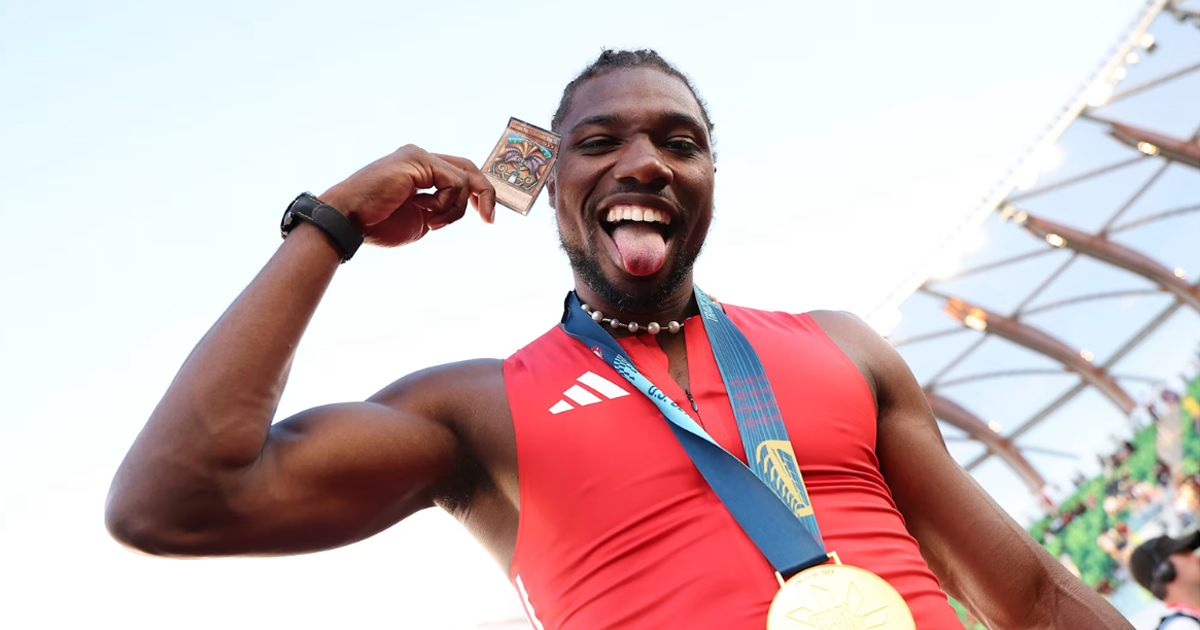Pop Culture Shows Its Mettle at Olympic Games

By Mark Seavy
The barriers to pop culture have gradually eroded as it cleared another hurdle during the Summer Olympics in Paris.
Olympic athletes have put pop culture on the world stage during the past two weeks, boosting brand awareness beyond the typical marketing programs. It also was a sign of athletes further wresting control of their brands from typical sponsors largely via social media.
Sprinter Noah Lyles, a gold and bronze medalist in the 100- and 200-meter dashes, respectively, and Chase Easley, a gold medalist in the women’s shotput, for example, shared an affinity for anime. Lyles bet Easley that if he continued to draw anime before races, Easley would wear Naruto-inspired Rock Lee leg weights.
Lyles followed through by pulling out a rare Blue-Eyes White Dragon card, which was introduced in 2002, from Konami Digital Media’s Yu-Gi-Oh franchise prior to a heat in the 100 meter dash. He then displayed an Exodia the Forbidden One card, which was part of same White Dragon set, before the start of the semi-finals in the 100 meters. He also ran with Yu-Gi-Oh card during the U.S. Olympic track and field trials. And he mimicked the signature “Kanehaneha” attack from Toei Animation’s Dragon Ball Z.
The there was U.S. pommel horse gold medal winner Stephen Nedoroscik who completed Spin Master Corp.’s Rubik’s Cube in under 20 seconds on the day of the U.S. Men’s Team Gymnastic Finals at the Games. Rapper/record producer/actor Snoop Dogg was omnipresent at Olympic in serving as a special correspondent for NBC-TV, torch bearer for Team USA and scheduled performer at the Olympics’ closing ceremonies on Sunday along with Billie Eilish and the Red Hot Chili Peppers.
“Any time a high-profile athlete showcases their fandom, it not only helps the IP they are promoting, but it also breaks down the barrier of nerd accessibility,” said Russel Binder, Founding Partner at Striker Entertainment. “It is pure validation that athletes are more than one dimensional and that, especially with the younger athletes, anime appears to be a preferred genre when it comes to entertainment IP. Most young male athletes are also avid gamers playing Call of Duty, Fortnite, and other multiplayer games which also bleed into their personas and accessories.”
Spin Master’s Rubik’s Cube, which is marking the 50th anniversary of its launch, benefitted the added promotion, a spokeswoman said. There has been a lift in sales from Nedoroscik spot lighting the product, she said. There also was a boost in interest and conversation via search and social media. Spin Master coincidentally had introduced a new Speed Cube a few weeks prior to the Olympics and retailers are chasing inventory amid a spike in demand, the spokeswoman said.
“When we saw his initial post, we created a mosaic as a nod to his performance and affinity for the cube,” the Spin Master spokeswoman said. “The Rubik’s Cube is celebrating its 50th anniversary this year and part of our campaign strategy is to capitalize on opportunities such as this to continue its relevancy and notoriety in pop culture.”
Yet the rub off from the Olympics was not limited to the 2024 Games or pop culture. And the major sponsors like Nike, Adidas, Under Armour, LVMH and Puma also shared the spotlight.
“Sponsors have been an integral part of the Olympics for decades, but social media has amplified opportunities to reach fans and go viral,” said Debra Joester, President of The Joester Loria Group. “Italian cheese, muffins, and even GAKU all had a moment as athletes showcase their love or support for sponsors. But the lasting impressions are likely to belong to a few iconic athletes and official sponsors, who are driving billions of impressions across media channels.”
Those impressions involved both past and present Olympians.
Former Olympic athlete Shawn Johnson East, who won a gold in artistic gymnastics at the 2008 Games, for example, launched a collaboration with Wayfair. It provided a glimpse of her Nashville, TN home with shoppable products from the ecommerce retailer as part of its House to Home video series.
UK runner Keely Hodgkinson, meanwhile, won gold in the women’s 800-meter race sporting lavender nails in joining other Olympic athletes in showcasing nail art. Hodgkins’ nails were a collaboration between herself and Nike that featured Greek Goddess of victory motifs created by nail artist Sylvie Macmillan. And Norwegian distance swimmer Henrik Christansen also highlighted on social media the popularity of the chocolate muffins available to athletes at the Olympic Village, providing a boost for their supplier, Paris baker Coup de Pates.
“The individual athletes are using their platform to show their true personalities which also involve their passions, brands and products,” said Ross Misher, CEO at Brand Central. “When Stephen Nedoroscik is solving a Rubik’s Cube during his bio sizzle, this organic marketing is a huge boost for Rubik’s Cube. It’s a great opportunity for the brand, in this case Spin Master, to approach him for a sponsorship because there is a true, authentic connection between the athlete and the product.”




